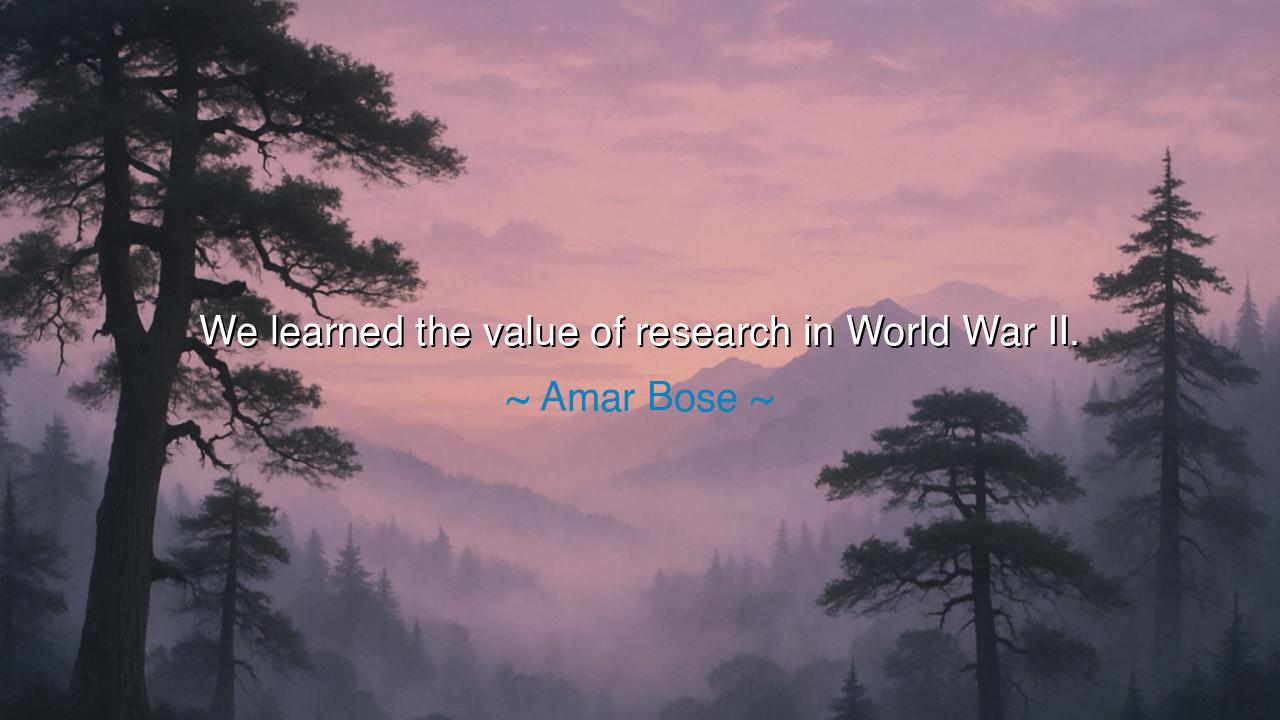
We learned the value of research in World War II.






The words of Amar Bose, the visionary founder of Bose Corporation, are not merely about science or invention. When he declared, “We learned the value of research in World War II,” he was not only recalling an era of conflict but unveiling a timeless truth — that in humanity’s darkest hours, the flame of knowledge becomes its most powerful weapon. In that great storm of nations, when destruction seemed to consume the earth, it was research — the disciplined search for understanding — that became both sword and shield. Bose’s words speak not only of technology, but of the human spirit’s unyielding quest to discover, to learn, and to overcome.
In the crucible of World War II, men and women across the world turned their minds into engines of salvation. The war, though born of violence, forced humanity to look deeper into the mysteries of nature — into physics, chemistry, medicine, and engineering — to find the means of survival. It was then that radar pierced the fog of uncertainty, that penicillin saved countless soldiers from infection, and that cryptographers, through the power of mathematics, unraveled the secrets of their enemies. Amid chaos, research became the quiet force that determined the fate of nations. What Bose recognized was not the glory of war, but the enduring lesson that knowledge pursued with purpose can shape the destiny of mankind.
Consider the story of Alan Turing, the British mathematician who labored in silence at Bletchley Park. Surrounded by secrecy and burdened by despair, Turing waged his own invisible war — not with bullets, but with thought. His invention, the machine that would break the Enigma code, shortened the war and saved millions of lives. Yet he received neither wealth nor triumph in his lifetime, only the satisfaction of knowing that research, when guided by truth and courage, has the power to alter history itself. His tale stands as an eternal monument to the idea that discovery, even in the shadow of destruction, is humanity’s highest calling.
From that age of turmoil was born a new faith in science and inquiry. The men and women who lived through those years came to understand that progress is not the fruit of chance, but of patient, methodical effort — the tireless questioning of what is possible. Amar Bose himself was a child of that awakening. His studies at MIT, his experiments, his refusal to accept mediocrity in sound, all flowed from the conviction that research is sacred — that to ask “why” and “how” is the first step toward making the world more beautiful, more harmonious, and more humane.
Yet Bose’s words are also a warning. For just as research can create, it can destroy. The same war that gave us radar and medicine also gave us the atomic bomb. Thus, the value of research lies not merely in its discoveries, but in the wisdom that guides them. Knowledge without virtue is like fire without control — it can illuminate or consume. The ancients knew this truth: Prometheus, who brought fire to mankind, was both savior and sinner. So too, modern humanity must remember that the fruits of research must be tended with care, lest they poison the very tree that bore them.
To the seekers of today, to those who dwell in laboratories, libraries, and classrooms — learn from Bose’s remembrance. Research is not only for scientists; it is for all who seek truth. It is the habit of questioning, of refusing to accept ignorance as destiny. When faced with uncertainty, let your mind be curious rather than fearful. When confronted by the unknown, do not retreat, but observe, measure, and explore. For the world advances not by those who guess, but by those who investigate.
The lesson is eternal: Knowledge is strength, and research is its path. Let us, then, approach every problem with the reverence of a philosopher and the discipline of a craftsman. Ask, seek, test, and build — not for glory, but for the service of humankind. Let us remember that the greatest discoveries are not those that win wars, but those that win peace. And may the words of Amar Bose echo within every generation that follows: that in learning, in questioning, in the ceaseless pursuit of understanding, humanity finds both its salvation and its destiny.






AAdministratorAdministrator
Welcome, honored guests. Please leave a comment, we will respond soon